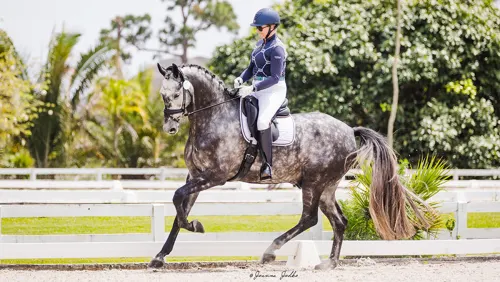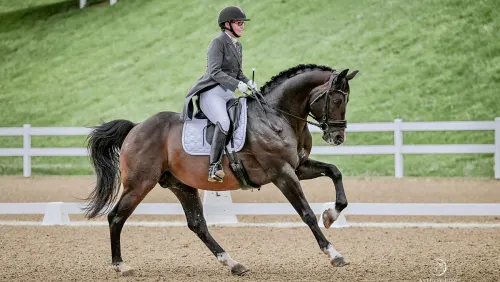Are you excited about the upcoming World Dressage Masters in West Palm Beach? Totilas won’t be there, but one of the newest dressage superstars will: British phenom Charlotte Dujardin. Carl Hester will be riding as well, although not on his most famous mount, stallion Uthopia. Did you ever wonder how the British dressage team went from being the redheaded stepchild of equestrian disciplines in Great Britain to winning team gold at the FEI European Championships over perennial powerhouses Germany and the Netherlands?
If you were going by historic results, eventing would be the discipline most likely to deliver team gold for Great Britain at the 2012 London Olympic Games.
But in the space of just one Olympiad, British dressage has rocketed from poor relation to world super power. In 2009, Britain broke the 50-year German-Dutch stranglehold with team silver at the Alltech FEI European Dressage Championships and repeated the feat at the 2010 Alltech FEI World Equestrian Games (Ky.).
Then, at the FEI European Dressage Championships held in August this year in Rotterdam, the Netherlands, Carl Hester, Charlotte Dujardin, Laura Bechtolsheimer and Emile Faurie captured a historic first European team gold by such a margin that they could have substituted Faurie’s “discard” score for Hester’s top score and still won.
Great Britain has produced stand-out riders in earlier generations: In 1978 Jennie Loriston-Clarke won world individual bronze; in 1984 Christopher Bartle finished sixth in the individual competition at the Los Angeles Olympic Games; in 1988 David Hunt became the only British rider to win the three key tests at the Rotterdam CHIO (the Netherlands); and in 1993 Faurie won individual European bronze (Slovenia).
But these were false dawns, and as a team, Britain straggled along in the bottom half at all but one of the last eight Olympic Games.
So what has finally come together to reverse British fortunes in such dramatic style?
Strength In Numbers
First, there was an indirect benefit from the power struggle between Germany and the Netherlands, which resulted in both countries relying on a single superstar horse to plump up their aggregate score.
Britain is the country with strength in depth. In Rotterdam, Hester (Uthopia), Dujardin (Valegro) and Bechtolsheimer (Mistral Hojris) each scored over 77 percent in the Grand Prix. Along with Faurie (Elmegardens Marquis), who got the fourth slot, four other riders—Richard Davison, Emma Hindle and Fiona Bigwood, all previous team medalists, as well as Henriette Andersen—had shown they could score around 70 percent, making selection more open than ever.
Hunt is now chairman of the International Dressage Trainers Club. “Britain has not always been good in a training situation about knowing which competitions abroad riders should attend,” he said. “Now it is all about getting out there and being part of the European scene, which we could never do when we were relying on just one or two good horses.”
Hester also thinks that any “mental blocks” harbored by continental judges have evaporated. “They don’t automatically think in 6s the minute a Brit enters the arena,” he said. “We now have a reputation, and that counts for a lot at the major continental shows.”
Secondly, there has been a massive shift in perception about dressage within British equestrianism. Its national organization has a larger participant base than jumping and eventing and attracts younger riders. The average age of the 2011 dressage team was 35, lower than that of its eventing and show jumping equivalents (39 and 44 respectively).
ADVERTISEMENT
Malcolm Wallace was the British team manager at four Olympic Games during the 1980s and early 1990s, and he respectfully recalled that his dressage squads comprised a large complement of mature ladies.
“Dressage was thought of as something eventers did after they retired,” he said. “It took ‘pure’ dressage riders to make the breakthrough. The move away from traditional hunting families and the British culture of cross-country, towards a riding fraternity with ‘new’ money who actually enjoyed arena-based sports, has been the catalyst.”
Christopher Bartle was a relative baby, aged 29, when he burst upon the dressage scene. “I was around for the innovation of freestyle to music, and that definitely opened younger riders to the idea that dressage was cool,” he said.
One difficulty the British face in drawing new riders to the sport is the media obsession with the wealthy background of some riders. In the mainstream media, it’s impossible to find a mention of Bechtolsheimer without reference to her billionaire property magnate grandfather Karl-Heinz Kipp, or that Hindle’s father is on the Sunday Times rich list: the U.K. equivalent of Forbes.
But at the other end is Faurie, who comes from South Africa, and he only began riding at age 16. He jobbed his way across Europe, landing in Britain in time to make an impact, achieve British nationality and ride at Barcelona in 1992 with Virtu. Faurie is passionate about the therapeutic and character-building attributes of riding, and in 2006 he founded a charity, which has delivered riding lessons to 10,000 children from urban and disadvantaged backgrounds.
And then there is Hester, who has been central to the British team for 20 years. He was brought up on the tiny Channel Island of Sark. He really did learn to ride on a donkey, only getting his breaks when he moved to mainland Britain at the age of 19, initially to event.
A Helping Hand
Hester’s second job in horses was riding for Dr. Wilfried Bechtolsheimer, a generous employer who gave his young apprentice early opportunities in the “big time.”
Hester, now 42, was determined to do the same for his assistant trainer Dujardin. “I saw in her what I’d desperately wanted for myself 20 years ago,” he said. Hester is also mentoring another protégé, Katie Bailey.
“With Dr. B., I went to European, World and Olympic Games all in the space of three years so was molded very quickly, though I soon developed my own ideas. I’m one of those people who just loves being taught, but now it’s in a different way—Charlotte and I are each others’ eyes on the ground,” said Hester.
“She’s had success quickly because she can shut everything out except the job in hand. She’s like feeding a computer—you never have to tell her anything twice!”
The Funds Are There
Last but not least, British dressage has benefitted from lottery funding—a contribution from the government to all elite equestrian sports to the tune of several million dollars a year. It is performance target-related and embraces the three Olympic equestrian disciplines plus Britain’s record-breaking para-equestrians.
ADVERTISEMENT
Prior to 1997 there was no external funding—unlike in Germany, where funds were partly derived from its lucrative sport horse breeding industry, or France, where equestrian once thrived on generous handouts from its horseracing pari-mutuel.
But in 1996, Britain returned virtually empty-handed from the Atlanta Olympic Games. Around that time, Britain’s first authorized national lottery had been launched, and amid a national mood of sporting shame, the government decided to divert lottery proceeds to a new World Class Performance Programme similar to that successful in other countries.
In equestrian, WCPP money cannot be used on capital projects or horse purchase, but it provides a plethora of 24/7 back-up services, training, sports psychology, mentoring and, in particular, veterinary support that was non-existent 20 years ago.
The number of WCPP-related personnel does lead to comments that Britain applies for too many championship accreditations. There is also speculation that the government will drastically scale down WCPP after London 2012. But for now the system is delivering.
“I can well remember that for my first championship abroad, Carl and I were waved off on the cross-channel ferry, and that was pretty well it. I don’t think anyone even phoned us for a debriefing when we got back!” said Faurie. “Nowadays, thanks to World Class, Britain’s horses arrive at major competitions in better condition than anyone else’s.
“Last season my horse knocked himself at a prize-giving and was slightly lame,” he continued. “In the past I would probably have taken him home and rested him for a week before having a further look, but World Class dealt with it there and then, straight to the Animal Health Trust at Newmarket [the U.K.’s leading bloodstock, racing and veterinary research center] for an MRI scan. The attention to detail is just amazing.”
Each discipline has its own performance manager, and the overall is headed by ex-Army officer and eventing rider Will Connell.
A realist, Connell is already looking beyond 2012, and he’s also only too aware that British dressage is at the mercy of market forces: Dujardin sold her own Grand Prix horse Fernandez to Norway soon after Rotterdam.
“Rotterdam was memorable, outstanding, almost unbelievable, but it is in the past,” Connell said. “Dressage is also a business, and we must acknowledge that top horses are very valuable assets. I hope we can keep the A team together for 2012, but post London we must prepare for changes. If we want to stay at the top we need to attract as many owners as possible and also seek to develop investment from the private sector.”
Meanwhile, Bartle is prepared for his 28-year record as Britain’s best Olympic performer to be broken.
“I am surprised that Wily Trout’s Olympic record has stood so long, given the strong performances since then by the likes of Emile Faurie as well as Carl and Laura,” said Bartle. “I will be delighted when they achieve what they are capable of at London 2012.”
If you enjoyed this article and would like to read more like it, consider subscribing. A version of “How Did British Dressage Get So Good?” ran in the December 19 & 26, 2011, issue. Check out the table of contents to see what great stories are in the magazine this week.















